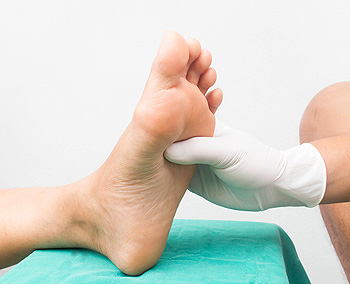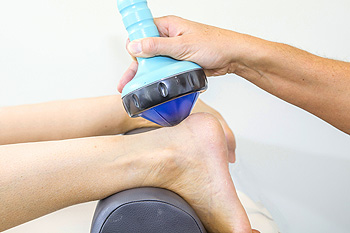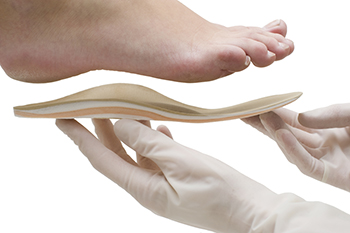
Drexel Hill (484) 521-0233
West Chester (610) 436-5883

Drexel Hill (484) 521-0233
West Chester (610) 436-5883

Anyone with diabetes is subject to foot and lower leg problems, including ulcers, gangrene, and possible amputation. These conditions may be the result of long-term high blood sugar levels, which can cause neuropathy and peripheral artery problems. For that reason, as a diabetic, constant and vigilant care of your feet is essential. If you are unable to check your feet, please ask someone to help you. Some people use a mirror to check the bottom of their feet. Look for changes in skin color; red indicates a problem with your footwear, but blue or black could mean bruising or blood flow problems. Look for blisters or any break in the skin that could become infected. Keep these areas clean and dry, and apply sterile coverings. Check for moisture between the toes, which is a good place for bacterial or fungal infections, such as athlete’s foot, to develop. Notice any numbness, tingling, or inability to detect temperature, hot or cold. Look for sores that do not heal properly, because they may become ulcerated. As a diabetic, it is a good idea to have regularly scheduled visits with a podiatrist who can help to monitor changes to your feet and treat them quickly.
Diabetic foot care is important in preventing foot ailments such as ulcers. If you are suffering from diabetes or have any other concerns about your feet, contact the podiatrists from Dr. Siegerman & Associates. Our doctors can provide the care you need to keep you pain-free and on your feet.
Diabetic Foot Care
Diabetes affects millions of people every year. The condition can damage blood vessels in many parts of the body, especially the feet. Because of this, taking care of your feet is essential if you have diabetes, and having a podiatrist help monitor your foot health is highly recommended.
The Importance of Caring for Your Feet
Patients with diabetes should have their doctor monitor their blood levels, as blood sugar levels play such a huge role in diabetic care. Monitoring these levels on a regular basis is highly advised.
It is always best to inform your healthcare professional of any concerns you may have regarding your feet, especially for diabetic patients. Early treatment and routine foot examinations are keys to maintaining proper health, especially because severe complications can arise if proper treatment is not applied.
If you have any questions please feel free to contact one of our offices located in Drexel Hill and West Chester, PA . We offer the newest diagnostic and treatment technologies for all your foot and ankle needs.
 Falling down a flight of stairs can cause many injuries, some quite serious. It is not uncommon for a person to take such a fall and sustain a foot or ankle fracture. Since other injuries, like dangerous and life-threatening head injuries, can occur from falling, it is imperative that falls be carefully evaluated and treated promptly. An ankle sprain is when the ligaments that stabilize the ankle joint stretch or tear. Foot and ankle fractures are breaks in bones. With either of these, pain will be intense, and walking will be difficult, if not impossible. The foot or ankle will likely become swollen, and bruising may appear. Practice safety tips when climbing up or down steps. Use a handrail with at least one hand. If the stairs are in your home, try covering them with a non- slippery surface, such as carpet. Make sure the stairs are well lit and free of objects that could pose as falling hazards. If you should fall on stairs and injure your feet, contact a podiatrist who can examine your ankle, determine whether it is a sprain or fracture, and provide appropriate treatment options.
Falling down a flight of stairs can cause many injuries, some quite serious. It is not uncommon for a person to take such a fall and sustain a foot or ankle fracture. Since other injuries, like dangerous and life-threatening head injuries, can occur from falling, it is imperative that falls be carefully evaluated and treated promptly. An ankle sprain is when the ligaments that stabilize the ankle joint stretch or tear. Foot and ankle fractures are breaks in bones. With either of these, pain will be intense, and walking will be difficult, if not impossible. The foot or ankle will likely become swollen, and bruising may appear. Practice safety tips when climbing up or down steps. Use a handrail with at least one hand. If the stairs are in your home, try covering them with a non- slippery surface, such as carpet. Make sure the stairs are well lit and free of objects that could pose as falling hazards. If you should fall on stairs and injure your feet, contact a podiatrist who can examine your ankle, determine whether it is a sprain or fracture, and provide appropriate treatment options.
Broken ankles need immediate treatment. If you are seeking treatment, contact the podiatrists from Dr. Siegerman & Associates. Our doctors can provide the care you need to keep you pain-free and on your feet.
Broken Ankles
A broken ankle is experienced when a person fractures their tibia or fibula in the lower leg and ankle area. Both of these bones are attached at the bottom of the leg and combine to form what we know to be our ankle.
When a physician is referring to a break of the ankle, he or she is usually referring to a break in the area where the tibia and fibula are joined to create our ankle joint. Ankles are more prone to fractures because the ankle is an area that suffers a lot of pressure and stress. There are some obvious signs when a person experiences a fractured ankle, and the following symptoms may be present.
Symptoms of a Fractured Ankle
If you suspect an ankle fracture, it is recommended to seek treatment as soon as possible. The sooner you have your podiatrist diagnose the fracture, the quicker you’ll be on the way towards recovery.
If you have any questions, please feel free to contact one of our offices located in Drexel Hill and West Chester, PA . We offer the newest diagnostic and treatment technologies for all your foot care needs.

Extracorporeal Shock Wave Therapy (ESWT) is a non-invasive treatment for many painful and chronic conditions such as plantar fasciitis and Achilles tendonitis. This type of treatment is performed outside the body (extracorporeally) and works by targeting the damaged tissue or bone with acoustic shock waves using ultrasound to precisely pinpoint the area. The acoustic sound waves create a controlled reaction within the tissue that ultimately regenerates cells and blood vessels, resulting in repairing the tissue and relieving pain. Unlike surgery, ESWT requires no prolonged recovery time. If you are suffering from plantar fasciitis or a painful Achilles tendon issue, you might benefit from consulting with a podiatrist to discuss whether you are a good candidate for ESWT.
Shockwave therapy is a treatment commonly used to treat various injuries and conditions, particularly plantar fasciitis in the feet. To learn more, consult with the podiatrists from Dr. Siegerman & Associates. Our doctors can provide the care you need to keep you pain-free and on your feet.
Shockwave Therapy
Shockwave therapy is a new treatment option designed to treat bone conditions such as tennis elbow, shoulder pain, and others. Shockwave therapy uses high intensity sound waves that are directed to the affected tissues of the body with pinpoint accuracy. The effects are very beneficial, leading to a production of collagen fibers, eliminating inflammation.
Who Benefits from Shockwave?
Shockwave is recommended for patients suffering from heel pain and associated problems. Heel pain is a common condition which can be caused by obesity, overexertion, and spending a substantial amount of time on hard floors with your feet exposed and unsupported.
Fast and Easy
The therapy is actually a simple process that can leave patients feeling better the very next day. Shockwave therapy is not as dramatic as it sounds. It enables more blood flow to effected areas, addressing the source of the problem and allowing treatment to last for a long time.
Treatment & Recovery Time
Shockwave treatment will enable your feet to recover quickly. This is especially important since surgery is not required. It is cost effective and does not require the use of anesthesia. This treatment is a better option to surgery, since it is proven safe.
If you have any questions, please feel free to contact one of our offices located in Drexel Hill and West Chester, PA . We offer the newest diagnostic and treatment technologies for all your foot and ankle needs.

Orthotics are defined as inserts that are placed inside of a shoe that may help with specific foot conditions. They can be prescribed for toe or foot deformities, flat feet, or plantar fasciitis. There are certain things to consider when determining if orthotics are right for you. These can consist of existing scar tissue in the foot, any foot deformities, and the patient’s activity level. An effective method to measure for custom-made orthotics includes taking a plastic mold of the patient’s feet and adding specific materials which may provide relief from existing pressure. After the orthotics are worn it is beneficial for the feet to be closely monitored. Problematic symptoms to look for include swelling, redness, or if a foot ulcer has formed. If you have a foot condition that is causing you pain, it is strongly advised that you are under the care of a podiatrist who can effectively determine if orthotics are the right treatment for you.
If you are having discomfort in your feet and would like to try orthotics, contact the podiatrists from Dr. Siegerman & Associates. Our doctors can provide the care you need to keep you pain-free and on your feet.
What Are Orthotics?
Orthotics are inserts you can place into your shoes to help with a variety of foot problems such as flat feet or foot pain. Orthotics provide relief and comfort for minor foot and heel pain but can’t correct serious biomechanical problems in your feet.
Over-the-Counter Inserts
Orthotics come in a wide variety of over-the-counter inserts that are used to treat foot pain, heel pain, and minor problems. For example, arch supports can be inserted into your shoes to help correct overarched or flat feet, while gel insoles are often used because they provide comfort and relief from foot and heel pain by alleviating pressure.
Prescription Orthotics
If over-the-counter inserts don’t work for you or if you have a more severe foot concern, it is possible to have your podiatrist prescribe custom orthotics. These high-quality inserts are designed to treat problems such as abnormal motion, plantar fasciitis, and severe forms of heel pain. They can even be used to help patients suffering from diabetes by treating foot ulcers and painful calluses and are usually molded to your feet individually, which allows them to provide full support and comfort.
If you are experiencing minor to severe foot or heel pain, it’s recommended to speak with your podiatrist about the possibilities of using orthotics. A podiatrist can determine which type of orthotic is right for you and allow you to take the first steps towards being pain-free.
If you have any questions please contact one of our offices located in Drexel Hill and West Chester, PA . We offer the newest diagnostic and treatment technologies for all your foot and ankle needs.
Request a free copy of
Laser Away Foot Pain!
today.
